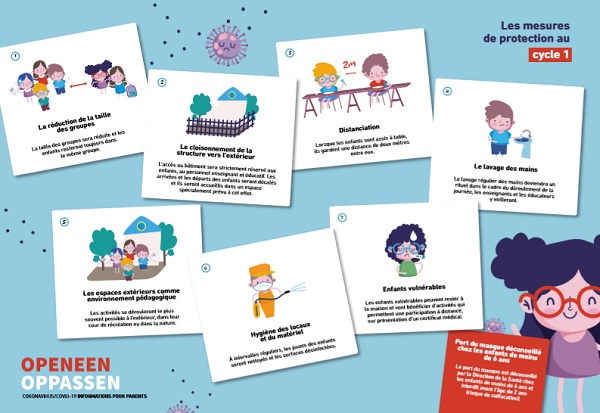
On Monday week, 25 May 2020, all children who attend primary school in the Grand Duchy will return to school after 10 weeks of confinement.
Crèches and mini-crèches will also re-open, and Centres of Competence in specialised educational psychology will also re-open for pupils with special needs.
According to Luxembourg's Ministry of National Education, Children and Youth, the benefits of returning to school outweigh the risks of maintaining containment. Young children in particular need a regular rhythm, landmarks and rituals which give them a feeling of security.
To protect the entire educational community and limit the spread of COVID-19, time and space will be organised differently and strict barrier measures will be put in place. It is on the basis of the health recommendations of the Ministry of Health that the Ministry of National Education, Children and Youth has declined the barrier measures according to the profile of the children: young children in crèche, young children in primary / cycle 1 and pupils with special needs.
Primary (Cycle 1) classes and crèches will therefore be far from functioning as before confinement. Strict protection and hygiene measures adapted to their age are being put in place. The new organisation aims to reduce the number of people with whom children come into contact. Thus, the functioning of classes in cycle 1 will make it possible to soften barrier gestures that are difficult to impose on children of this age group. The success of these measures requires the collaboration of all stakeholders: teachers and educators will make every effort to ensure a reassuring and beneficial return to school for children, with the cooperation of parents.
How will this work in practice? Each class is being divided into two groups coming to school alternately. Access to school buildings is strictly reserved for children, teaching and educational staff. Activities take place as often as possible outside, in the playground or in nature. Meals will take place in the classroom (children of group A), and in the reception structure (children of group B).
For staff, whenever the interpersonal distance of 2m between adults cannot be respected, the wearing of a mask or any other device covering the mouth and nose is compulsory. With children, staff cannot always cover their faces because children need to see facial expressions to feel safe. Physical contact with children cannot be completely avoided when it comes, for example, to comforting a child or helping him with daily gestures. The adult will take care to wash their hands, possibly the face and that of the child after such physical contact.
For children, regular hand washing will become a ritual during the course of the day, with teachers and educators ensuring this. At school, when the children are seated at a table, they are to keep a distance of 2m between them, if possible. Wearing a mask is not recommended for children under 6 years of age as it can increase the risk of infection because the child regularly touches the mask and his face with his hands. However, special instructions (such as wearing special masks) may apply to highly vulnerable children, following instruction from their doctor.
Crèches are to set up protective measures adapted to the needs and capacities of the children so as to limit as much as possible the number of external people in contact with children. Thanks to this limitation, barrier gestures such as social distancing or lack of physical contact can soften within groups of children. For this to work, parents' cooperation is central: they will be closely involved in the implementation and compliance with the barrier measures. Educators will set an example for children on a daily basis by adopting the appropriate behaviour themselves. These measures apply to all crèches, both commercial and contracted.
In practice, for nurseries, groups are reduced to a maximum of 5 children, in order to leave them as much space as possible, with the same educator taking care of the same group of children, if possible. Activities take place as often as possible outside and the cleaning of places, equipment and toys is done regularly and carefully (Equipment and toys that cannot be cleaned are not used); also, eals take place in the group's room.
All education and reception contracts concluded between parents and the reception structure before 25 May 2020 are suspended from 25 May 2020 until 15 July 2020. For each registration from 25 May 2020 a new contract is concluded, both for newly registered children and for children already registered before the suspension. The duration of this new contract is limited to 15 July 2020. After this date, contracts in force before 16 March 2020 will come into force again.








